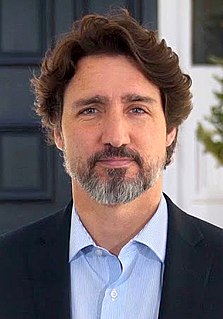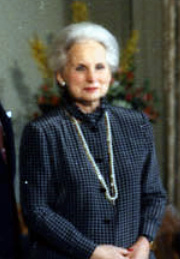Related Research Articles

The prime minister of Canada is the primary minister of the Crown. The prime minister chairs the Cabinet and selects its members, advises the Crown on the exercise of executive power, and acts as the head of government for Canada. The prime minister is appointed on the ability to command the confidence of the House of Commons, and is responsible to Parliament.

The governor general of Canada is the federal viceregal representative of the Canadian monarch, currently Queen Elizabeth II. The Queen, as a political sovereign, is shared equally with the 15 other Commonwealth realms and the 10 provinces of Canada, but she physically resides predominantly in her oldest and most populous realm, the United Kingdom. The Queen, on the advice of her Canadian prime minister, appoints a governor general to carry on the Government of Canada in her own right, and, as ex officio viceroy, most of her constitutional and ceremonial duties, that is, the royal prerogative. The commission is for an unfixed period of time—known as serving at Her Majesty's pleasure—though five years is the normal convention. Beginning in 1959, it has also been traditional to rotate between anglophone and francophone officeholders—although many recent governors general have been bilingual. Once in office, the governor general maintains direct contact with the Queen, wherever she may be at the time.

The House of Commons of Canada is the lower chamber of the bicameral Parliament of Canada, which also comprises the sovereign and the Senate of Canada. The House of Commons currently meets in a temporary Commons chamber in the West Block of the parliament buildings on Parliament Hill in Ottawa, while the Centre Block, which houses the traditional Commons chamber, undergoes a ten-year renovation.

Jeanne Mathilde Sauvé was a Canadian politician, and journalist who served as Governor General of Canada, the 23rd since Canadian Confederation.

The Parliament of Canada is the federal legislature of Canada, seated at Parliament Hill in Ottawa, and is composed of three parts: the Monarch, the Senate, and the House of Commons. By constitutional convention, the House of Commons is dominant, with the Senate rarely opposing its will. The Senate reviews legislation from a less partisan standpoint and may initiate certain bills. The monarch or her representative, normally the governor general, provides royal assent to make bills into law.

The Senate of Canada is the upper house of the Parliament of Canada. The Senate is modelled after the British House of Lords and consists of 105 members appointed by the governor general on the advice of the prime minister. Seats are assigned on a regional basis: four regions—defined as Ontario, Quebec, the Maritime provinces, and the Western provinces—each receives 24 seats, with the last nine seats allocated to the remaining portions of the country: six to Newfoundland and Labrador and one each to the three northern territories. Senators serve until they reach the mandatory retirement age of 75.

Royal assent is the method by which a monarch formally approves an act of the legislature, either directly or through an official acting on the monarch's behalf. In some jurisdictions, royal assent is equivalent to promulgation, while in others that is a separate step. Under a modern constitutional monarchy, royal assent is considered little more than a formality. Even in nations such as the United Kingdom, Norway and Liechtenstein which still, in theory, permit their Monarch to withhold assent to laws, the Monarch almost never does so, except in a dire political emergency or on advice of government. While the power to veto by withholding royal assent was once exercised often by European monarchs, such an occurrence has been very rare since the eighteenth century.

The Order of Canada is a Canadian national order and the second highest honour for merit in the system of orders, decorations, and medals of Canada, after the Order of Merit.
The Right Honourable is an honorific style traditionally applied to certain persons and collective bodies in the United Kingdom, the former British Empire and the Commonwealth of Nations. The term is predominantly used today as a style associated with the holding of certain senior public offices in the United Kingdom, Canada, Kenya, The Bahamas and New Zealand.

Edward Richard Schreyer is a Canadian politician, diplomat, and statesman who served as Governor General of Canada, the 22nd since Canadian Confederation.
The Cabinet of Canada is a body of ministers of the Crown that, along with the Canadian monarch, and within the tenets of the Westminster system, forms the government of Canada. Chaired by the prime minister, the Cabinet is a committee of the Queen's Privy Council for Canada and the senior echelon of the Ministry, the membership of the Cabinet and ministry often being co-terminal; as of November 2015 there are no members of the latter who are not also members of the former.

Jean Augustine is a Grenadian-Canadian educational administrator, advocate for social justice, and politician. She was said to have been the first Black Canadian woman elected to the House of Commons.

The Queen's Privy Council for Canada, sometimes called Her Majesty's Privy Council for Canada or simply the Privy Council (PC), is the full group of personal consultants to the monarch of Canada on state and constitutional affairs. Practically, the tenets of responsible government, requires the sovereign or her viceroy, the governor general of Canada, to almost always follow only that advice tendered by the Cabinet: a committee within the Privy Council composed usually of elected members of Parliament. Those summoned to the QPC are appointed for life by the governor general on the advice of the prime minister of Canada, meaning that the group is composed predominantly of former Cabinet ministers, with some others having been inducted as an honorary gesture. Those in the council are accorded the use of an honorific style and post-nominal letters, as well as various signifiers of precedence.
The federal government of Canada is the body responsible for the federal administration of Canada. In Canadian English, the term can mean either the collective set of institutions or specifically the Queen-in-Council. In both senses, the current construct was established at Confederation through the Constitution Act, 1867—as a federal constitutional monarchy, wherein the Canadian Crown acts as the core, or "the most basic building block", of its Westminster-style parliamentary democracy. The Crown is thus the foundation of the executive, legislative, and judicial branches of Canadian government. The monarch is personally represented by the Governor General of Canada. The Prime Minister is the head of government who is invited by the Crown to form a government after securing the confidence of the House of Commons, which is typically determined through the election of enough members of a single political party in a federal election to provide a majority of seats in Parliament, forming a governing party. Further elements of governance are outlined in the rest of the Canadian Constitution, which includes written statutes in addition to court rulings, and unwritten conventions developed over centuries.

The Speaker of the Senate of Canada is the presiding officer of the Senate of Canada. The Speaker represents the Senate at official functions, rules on questions of parliamentary procedure and parliamentary privilege, and presides over debates and voting in the senate. The current Speaker is George Furey who assumed office upon nomination by Prime Minister Justin Trudeau on December 3, 2015, succeeding Leo Housakos.
The Office of the Conflict of Interest and Ethics Commissioner of Canada is an entity of the Parliament of Canada. The Conflict of Interest and Ethics Commissioner is an independent Officer of Canada's Parliament, who administers the Conflict of Interest Act and the Conflict of Interest Code for Members of the House of Commons. These two regimes seek to prevent conflicts between the public duties and private interests of elected and appointed officials.
The Board of Internal Economy is the body that governs the administrative and financial policies of the House of Commons of Canada. Unlike most committees of the Parliament of Canada, the Board of Internal Economy continues through prorogation and dissolution. The Board is presided over by the Speaker of the House of Commons.
Judith Anne LaRocque,, is a senior Canadian civil servant. Most notably, she served as Secretary to the Governor General of Canada and Herald Chancellor of Canada from 1990 until 2000. Since 2010, she has been Canada's Ambassador and Permanent Representative at the Organisation for Economic Co-operation and Development in Paris.

Sir David Lionel Natzler is a former Clerk of the House of Commons, the principal constitutional adviser to the House of Commons of the United Kingdom, and adviser on all its procedure and business. He was the 50th person to hold the role. Appointed by letters patent in March 2015, he was designated acting Clerk upon the retirement of Sir Robert Rogers in August 2014. He announced his retirement in a letter to the Speaker on 14 November 2018.

Dame Sandra Prunella Mason, GCMG, DA, QC is the Governor-General of Barbados. She was a practising Attorney-at-Law who has served as a High Court judge in Saint Lucia and a Court of Appeal judge in Barbados. She was the first woman admitted to the Bar in Barbados. She served as chair of the CARICOM commission to evaluate regional integration, was the first magistrate appointed as an Ambassador from Barbados, and was the first woman to serve on the Barbados Court of Appeals. She was the first Bajan appointee to the Commonwealth Secretariat Arbitral Tribunal and served briefly as the Governor General of Barbados. She has been called one of the 10 most powerful women in Barbados. In 2017, she was appointed as the 8th Governor General of Barbados, with a term beginning on 8 January 2018. Simultaneously with her appointment, Mason was awarded the Dame Grand Cross in the Order of Saint Michael and Saint George. On assumption of the office of Governor-General, Dame Sandra Mason, under the Order of Saint Andrew, became the Chancellor and Principal Dame of Saint Andrew.
References
- ↑ "Appendices - Clerks of the House of Commons Since 1867" . Retrieved 18 November 2014.
- ↑ "Office of the Clerk of the House of Commons" . Retrieved 15 September 2015.
- ↑ "Order of Canada Appointments". The Governor General of Canada His Excellency the Right Honourable David Johnston. Governor General of Canada . Retrieved 31 December 2015.